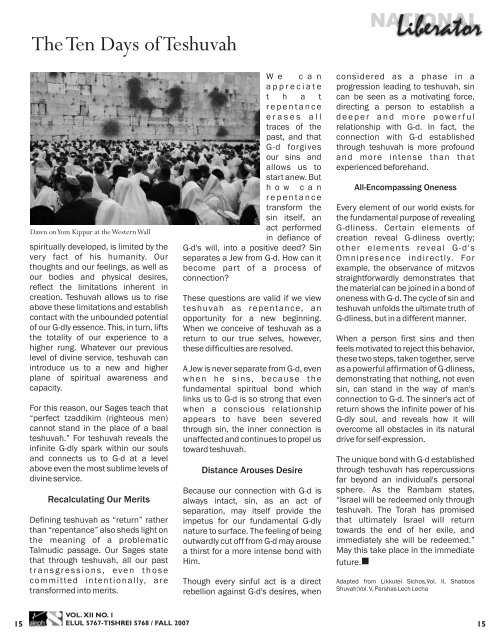Apple Dipped in Honey: For a Sweet New Year! - Jews in Green
Apple Dipped in Honey: For a Sweet New Year! - Jews in Green
Apple Dipped in Honey: For a Sweet New Year! - Jews in Green
You also want an ePaper? Increase the reach of your titles
YUMPU automatically turns print PDFs into web optimized ePapers that Google loves.
TheTen Days ofTeshuvahNATIONALLiberator.IDawn onYom Kippur at theWesternWallspiritually developed, is limited by thevery fact of his humanity. Ourthoughts and our feel<strong>in</strong>gs, as well asour bodies and physical desires,reflect the limitations <strong>in</strong>herent <strong>in</strong>creation. Teshuvah allows us to riseabove these limitations and establishcontact with the unbounded potentialof our G-dly essence. This, <strong>in</strong> turn, liftsthe totality of our experience to ahigher rung. Whatever our previouslevel of div<strong>in</strong>e service, teshuvah can<strong>in</strong>troduce us to a new and higherplane of spiritual awareness andcapacity.<strong>For</strong> this reason, our Sages teach that“perfect tzaddikim (righteous men)cannot stand <strong>in</strong> the place of a baalteshuvah.” <strong>For</strong> teshuvah reveals the<strong>in</strong>f<strong>in</strong>ite G-dly spark with<strong>in</strong> our soulsand connects us to G-d at a levelabove even the most sublime levels ofdiv<strong>in</strong>e service.Recalculat<strong>in</strong>g Our MeritsDef<strong>in</strong><strong>in</strong>g teshuvah as “return” ratherthan “repentance” also sheds light onthe mean<strong>in</strong>g of a problematicTalmudic passage. Our Sages statethat through teshuvah, all our pasttransgressions, even thosecommitted <strong>in</strong>tentionally, aretransformed <strong>in</strong>to merits.We canappreciatet h a trepentanceerases alltraces of thepast, and thatG-d forgivesour s<strong>in</strong>s andallows us tostart anew. Buthow canrepentancetransform thes<strong>in</strong> itself, anact performed<strong>in</strong> defiance ofG-d's will, <strong>in</strong>to a positive deed? S<strong>in</strong>separates a Jew from G-d. How can itbecome part of a process ofconnection?These questions are valid if we viewteshuvah as repentance, anopportunity for a new beg<strong>in</strong>n<strong>in</strong>g.When we conceive of teshuvah as areturn to our true selves, however,these difficulties are resolved.A Jew is never separate from G-d, evenwhen he s<strong>in</strong>s, because thefundamental spiritual bond whichl<strong>in</strong>ks us to G-d is so strong that evenwhen a conscious relationshipappears to have been severedthrough s<strong>in</strong>, the <strong>in</strong>ner connection isunaffected and cont<strong>in</strong>ues to propel ustoward teshuvah.Distance Arouses DesireBecause our connection with G-d isalways <strong>in</strong>tact, s<strong>in</strong>, as an act ofseparation, may itself provide theimpetus for our fundamental G-dlynature to surface. The feel<strong>in</strong>g of be<strong>in</strong>goutwardly cut off from G-d may arousea thirst for a more <strong>in</strong>tense bond withHim.Though every s<strong>in</strong>ful act is a directrebellion aga<strong>in</strong>st G-d's desires, whenconsidered as a phase <strong>in</strong> aprogression lead<strong>in</strong>g to teshuvah, s<strong>in</strong>can be seen as a motivat<strong>in</strong>g force,direct<strong>in</strong>g a person to establish adeeper and more powerfulrelationship with G-d. In fact, theconnection with G-d establishedthrough teshuvah is more profoundand more <strong>in</strong>tense than thatexperienced beforehand.All-Encompass<strong>in</strong>g OnenessEvery element of our world exists forthe fundamental purpose of reveal<strong>in</strong>gG-dl<strong>in</strong>ess. Certa<strong>in</strong> elements ofcreation reveal G-dl<strong>in</strong>ess overtly;other elements reveal G-d'sOmnipresence <strong>in</strong>directly. <strong>For</strong>example, the observance of mitzvosstraightforwardly demonstrates thatthe material can be jo<strong>in</strong>ed <strong>in</strong> a bond ofoneness with G-d. The cycle of s<strong>in</strong> andteshuvah unfolds the ultimate truth ofG-dl<strong>in</strong>ess, but <strong>in</strong> a different manner.When a person first s<strong>in</strong>s and thenfeels motivated to reject this behavior,these two steps, taken together, serveas a powerful affirmation of G-dl<strong>in</strong>ess,demonstrat<strong>in</strong>g that noth<strong>in</strong>g, not evens<strong>in</strong>, can stand <strong>in</strong> the way of man'sconnection to G-d. The s<strong>in</strong>ner's act ofreturn shows the <strong>in</strong>f<strong>in</strong>ite power of hisG-dly soul, and reveals how it willovercome all obstacles <strong>in</strong> its naturaldrive for self-expression.The unique bond with G-d establishedthrough teshuvah has repercussionsfar beyond an <strong>in</strong>dividual's personalsphere. As the Rambam states,“Israel will be redeemed only throughteshuvah. The Torah has promisedthat ultimately Israel will returntowards the end of her exile, andimmediately she will be redeemed.”May this take place <strong>in</strong> the immediatefuture.Adapted from Likkutei Sichos,Vol. II, ShabbosShuvah;Vol. V, Parshas Lech Lecha15VOL. XII NO. 1ELUL 5767-TISHREI 5768 / FALL 200715


